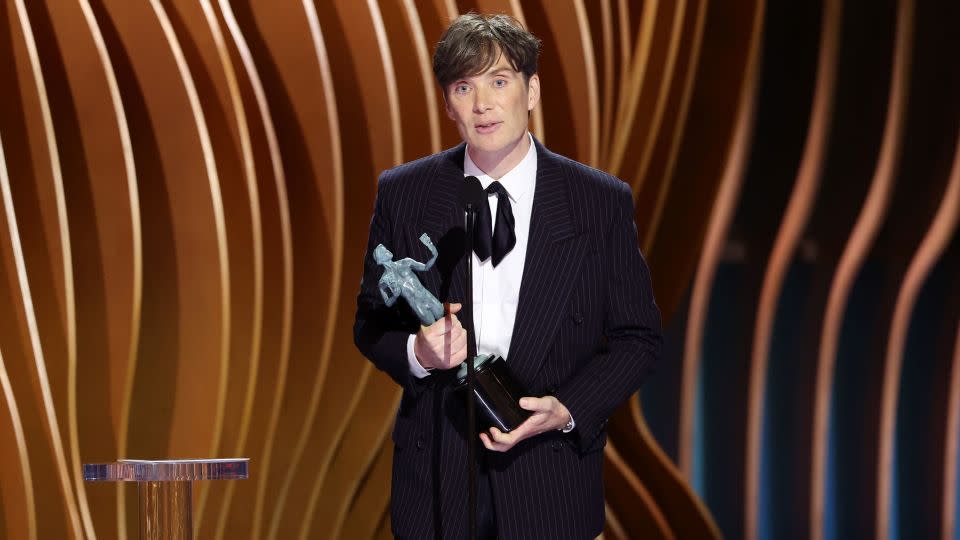Oscars 2024: ‘Barbie’ might be the belle of the ball, but it looks like ‘Oppenheimer’s’ night
If you drink every time someone mentions “Barbie” at this Sunday’s Oscars, you probably won’t be awake to see the best picture category presented, even with the show’s earlier start time. Yet while the year’s biggest box-office winner will get plenty of attention – due in part to its much-debated “snubs” – the 96th Academy Awards looks destined to be “Oppenheimer’s” night.
For “Barbie,” despite the omission of star Margot Robbie and Greta Gerwig as actress and director, respectively (both are nominated in other categories), the lesson from this year’s nominations is an old one. Comedian Martin Mull famously observed that Hollywood is just “high school with money,” and based on recent awards history, the most popular kid in school seldom gets to be the valedictorian, too.
The Oscars serve various functions, among them delivering a three-hour commercial encouraging people to go to the movies – an imperative that has taken on extra urgency amid an extended slump triggered by the one-two punch of Covid and streaming.
Still, award telecasts also need to attract an audience to ensure the networks airing them will keep paying big bucks for the privilege, and nominating movies more people have seen provides a stronger rooting interest and a potential means of boosting (or at least sustaining) TV ratings.
Award-show organizers have wrestled with this calculation in what might be called Hollywood’s superhero era, since “Iron Man” launched Marvel’s until-recently invulnerable run at the box office. The Academy of Motion Picture Arts and Sciences increased the number of best picture nominees in 2009 (after “The Dark Knight” didn’t make the cut) and flirted with adding a “popular film” award, hoping to invite more blockbusters to the party.
While few superhero or genre movies have managed to break through (“Black Panther” being an exception), “Barbie’s” mix of stars and social commentary nabbed eight nominations, including best picture. As awards season has progressed, though, voters from the industry’s guilds as well as journalist groups have gravitated toward “Oppenheimer,” a weighty historical film that, despite its own commercial success as the other half of “Barbenheimer,” hews closer to the template of past Oscar winners.
The award-industrial complex’s fondness for smaller films, further fueled by their availability via streaming services, is evident in the other best picture contenders.

As box-office hits “Barbie” and “Oppenheimer” are really the outliers, with the eight other best picture candidates – “American Fiction,” “Anatomy of a Fall,” “The Holdovers,” “Killers of the Flower Moon,” “Maestro,” “Past Lives,” “Poor Things,” and “The Zone of Interest” – totaling about $400 million in box office worldwide, a sum “Barbie” surpassed by more than $1 billion. (Figures aren’t even available for “Maestro,” which principally played on Netflix.)
“Anatomy of a Fall” (France) and the German-language “The Zone of Interest” are international releases, marking the first time two have been nominated for best picture in the same year. That continues a greater international presence across the entertainment space, from the history-making win by the South Korean film “Parasite” in 2020 to TV hits such as “Squid Game.”
Based on results leading up to the Oscars, “Oppenheimer” looks like a heavy favorite to win anywhere from six to as many as nine statuettes, including best picture and individual honors for director Christopher Nolan and actors Cillian Murphy and Robert Downey Jr.
“Barbie” (released by Warner Bros., like CNN, a unit of Warner Bros. Discovery) figures to have a more muted showing, with its best chances likely coming for song (with two of the nominees) and costume design.
Practically speaking, emphasizing the “snubs” from “Barbie” makes sense: It’s an easy, traffic-friendly headline for news outlets; nevertheless, that angle overlooks the biases the movie had to overcome – given its toy-inspired plot and blockbuster status – just being nominated. Contemplating the origins of the world’s fear of nuclear annihilation, obviously, is another matter.
Granted, arguments and second-guessing about award selections is a fundamental part of the process, sometimes long after the show’s over. Just ask any film historian about “How Green Was My Valley” beating out “Citizen Kane,” “Shakespeare in Love” upsetting “Saving Private Ryan” or the lightly regarded “Crash” getting chosen over “Brokeback Mountain.”
Given that, wherever one’s loyalties lie among this year’s nominees, those who still tune in live should just kick back, admire the fashions and, hopefully, enjoy the show. And if the awards hold to form, the night should end with a (very big) bang.
The 96th annual Academy Awards will air March 10 at 7 p.m. ET on ABC.
For more CNN news and newsletters create an account at CNN.com


